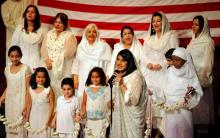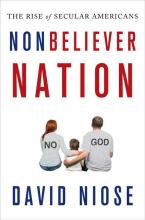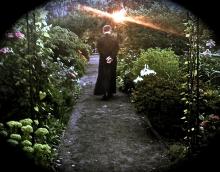Faith

I was home sick on Sept. 11, 2001. Amy had left for her grad school classes, so I was a little bit annoyed when she burst back in and woke me up.
“Turn on the TV,” she said. “Something bad is happening. Really bad.”
While watching the replayed video of the plane colliding with the first tower, the second tower attack came. And then there were the reports of similar attacks at the Pentagon and in Pennsylvania. At that moment, we had no idea when the bad news would stop coming. My first thought was for those loved ones I have in bigger cities, praying that they would not find themselves in harm’s way.
We watched the reports in silence for a few hours, trying to sort out what had just happened. Of course, there were no certainties about the attacks being over, but by now all planes had been grounded, and the American military was on high alert.
“I’m not sure how much more of this I can watch,” I told Amy, realizing it was nearly noon, and I was still sitting on the couch in my underwear. “We should try and do something.”
“Everything is closed,” she said. “Churches will probably have prayer services later, but not until tonight.” The zoo was the only thing we could find that was still operating, so we decided to go spend some time among some less self-destructive animal species. We settled by the gorilla habitat, where one lazy silverback leaned against the other side of the glass, just inches away from us. Though they usually tend to turn their backs to human observers, he was staring right at us. He seemed to be just on the verge of speaking:
What the hell is the matter with you people?

Two years after the Sept. 11 attacks, Timothy O'Leary sat in an audience of 2,000 New Yorkers listening to the Brooklyn Philharmonic perform a concert about terrorism — the 1985 murder of an American tourist by members of the Palestine Liberation Front on a Mediterranean cruise ship. It was one of the most powerful moments he'd ever had in a theater.
Terrorism stories are rarely happy stories, and yet the path O'Leary has taken — from bringing the controversial opera "The Death of Klinghoffer" to St. Louis last year to a Sept. 11 memorial concert on Sept. 9 — ends with a hopeful, permanent pairing of faith and the arts in St. Louis.

On Sept. 5, 1997, the world mourned when Mother Teresa, whose work with the poorest of the poor made her a global icon, died of a heart ailment at age 87.
Exactly 10 years later, the world did a double take, when a volume of Teresa's private letters revealed that the tireless, smiling nun spent the last 39 years of her life in internal agony. Jesus, she wrote, no longer seemed present to her, in prayer or even in the Eucharist. In letter after tormented letter she described an unrelenting spiritual "dryness,” a "torturing pain." Her smile was "a big cloak" of deception. She admitted at one point to doubting God's existence. Eventually she apparently became more reconciled to her condition; but as far as we know, she died with it.

Why did Jesus have to die? Was it to appease a wrathful God's demand for punishment? Does that mean Jesus died to save us from God? How could someone ever truly love or trust a God like that? How can that ever be called "Good News?"
It's questions like these that make so many people want to have nothing to do with Christianity.
Countless people filling our pews have adopted this hurtful view of God and themselves. It has led many to internalize feelings of shame and self-loathing, thinking this is what God desires. Others have lost their faith entirely because of it, unable to worship a God who seems to them to be a moral monster. Faith motivated by fear, threat, and feelings of worthlessness. How could things have gone so wrong?
When did the good news become bad news?

“In order to serve our world," Bono once said, "we must betray it."
I’ve always wanted to change the world. I’m inspired by stories of people who have left their fingerprints on the very face of culture. I want to be a historymaker. I want to be one who people remember as a person who revolutionized her world.
As noble as this sounds, I’m afraid that up until a few years ago, this has come from a very self-serving motivation. I truly did want to love people and make a difference for their benefit, but I also wanted the credit. Visions of winning a Nobel Prize danced through my mind; dreams of becoming the “woman of the year.” I’ve thought out speeches just in case.
I can’t believe I just admitted that to you. I must really like you.
I had to come to a broken place in order to be ready to bring about the change I so desired to initiate. You see, transformation, no matter how small or big, is never about us. It’s not about the recognition we will receive or about the merit badge that will feed your need for approval. No, it’s the most selfless thing we will ever do. We need to be trustworthy to lead such efforts.
All it takes is a heart that truly cares for others — that’s it. Once your eyes are off yourself, you become incredibly useful! What a thrill it is to add benefit to others and get no credit for it.

As an 11-year-old boy, Don Bradley went looking for gold plates.
After all, Mormon founder Joseph Smith said he was directed to a set of such plates, buried in a hill near his house in upstate New York.
On a childhood visit to that hill, Bradley turned over lots of rocks, feeling certain he might find some sacred record overlooked by others.
That quest for Mormon gold became a metaphor for Bradley's lifelong spiritual journey. It led him first to dig into Smith's history to enhance his LDS devotion and then to uncover uncomfortable facts and omissions in the faith's story, which bred disillusionment and distance.
Eventually, Bradley's research helped bring him back to the Mormon fold, this time with a broader view of Smith's spiritual abilities.
"I could describe many of the events of Joseph Smith's life, but I couldn't explain the thing that really mattered: why it all worked," Bradley, now 42, said in a July speech at the annual Sunstone Symposium, a conference in Salt Lake City for Mormon intellectuals. "Joseph Smith wasn't of interest because he'd been a merchant, a mayor, or even a much-married husband, but because he was the founder of a religion. And it was precisely the religious dimension I couldn't account for."
Besides rediscovering Mormonism, Bradley learned how to balance faith and facts, science and spirituality, reason and revelation.

I’ve attempted to catch some of the Republican National Convention last week and this week’s Democratic National Convention. Some of it has been educational, others infuriating, others confusing, and still, others very inspiring.
I am listening and watching as I want to be more deeply educated and informed so I can steward the privilege of voting with care, prayer, and discernment. But thus far (and I know that the DNC has just gotten underway), one clear observation for me from both the RNC and DNC has been the amazing voices, words, leadership, and speeches from…the women.
The three that obviously stood out for me were the speeches delivered by Ann Romney, Condoleezza Rice, and Michelle Obama. Ann’s speech was heartfelt and compelling. Condoleezza’s speech was inspiring and dare I say it…”presidential.” And wow, Michelle Obama’s speech was simply riveting. I found myself in tears on couple occasions during the FLOTUS’ speech.
As I soaked in the inspiring speeches from these women, I was mindful of the incredulous fact that the 19th Amendment to the American constitution — allowing women to vote — only took place in 1920. Just 92 years ago and with that, America became just the 27th country to support “universal suffrage.”
Without any offense intended to others — especially the male speakers — their speeches were the clear highlights. I don’t care what others will do or say during the DNC from here on out, no one is going to top the speech delivered by Michelle Obama.
But this isn’t my attempt to say that women are better than men, more articulate than men, more intelligent than men, or any other nonsensical comparisons. Rather, I want to simply communicate how incomplete the conventions would have been without their voices, words, challenges, and exhortations.
Imagine if only men were allowed to speak.

UDATE: (Posted 9/6/12)
Criticized by Republicans and some members of their own party, Democrats voted to restore the word “God” to the Democratic national platform late Wednesday (Sept. 5). The GOP had seized upon the omission as a failure of their opponents to appreciate the divine's place in American history.
GOP vice presidential nominee Paul Ryan took to the airwaves early Wednesday to blast the change from the Democrats’ 2008 platform. “I guess I would just put the onus and the burden on them to explain why they did all this, these purges of God,” Ryan said on “Fox & Friends.”
Ryan also attacked the Democratic platform’s initial failure to affirm Jerusalem as the capital of Israel, an issue important to some American Jews and conservative Christians. After a voice vote at the party's convention in Charlotte, language about God and endorsing Jerusalem as the capital was added.
God is mentioned 12 times in the 2012 GOP platform. The 2008 Democratic platform made one reference to God: the “God-given potential” of working people. The 2004 platform had numerous references to God.

A few examples of how clueless I am about male identity, and how mixed-up the gender roles are becoming, just in my own family:
I’ve never killed anything, at least on purpose. The only time I ever shot a gun was when my dad took me to the range and handed over his Ruger for a few rounds. I hated it. The noise was deafening, and the recoil scared the shit out of me.
I own a pathetic amount of tools for a man in his late thirties who has owned two homes. By my age, my dad and grandparents had staked their claim on the garage as exclusively male territory by covering every wall and bit of floor space with table saws, drills, vices and every wrench – standard and metric – anyone could ever need. I have more guitars than screwdrivers, and it was only a few years ago that I finally got straight in my head what the difference between channel locks and regular pliers is.
I like potpourri; my wife digs the nickel defense.
I changed more diapers in the first month of my son’s life than my dad ever did on me. I take care of the kids when Amy goes to meetings in the evenings, and I work from home every day.
I cry every time I watch Extreme Home Makeover. Amy records every episode of Real Sports on HBO. Oh, and I always cry when I watch that, too.
Damn you, Bryant Gumbel.
A court in Cologne, Germany, recently ruled that circumcising young boys represents grievous "bodily harm." The court found that the child’s "fundamental right to bodily integrity" was more important than the parents’ rights. According to the court, religious freedom "would not be unduly impaired" because the child could later decide whether to have the circumcision.
In response to the ruling, some Jews and Muslims who practice circumcision for religious reasons have protested vehemently. Subsequently, German politicians pledged to pass a law to protect ritual circumcision of young boys. Israeli Chief Rabbi Yona Metzger even traveled to Berlin to defend Jewish circumcisions, and a complaint against a Bavarian rabbi for performing circumcisions drew the anger of the Anti-Defamation League. The legal and cultural dilemma inherent in the issue makes prompt resolution unlikely.
Most of Germany (and the world) does not circumcise. It is instinctively viewed as harmful. Here's why...

[Editor's Note: David Niose is president of the American Humanist Association and vice president of the Secular Coalition for America, a group that lobbies on behalf of nontheist and secular Americans. In his new book, “Nonbeliever Nation: The Rise of Secular Americans,” he charts the development and growth of the religious right and what he sees as the increasingly organized response from Americans who are committed to the separation of church and state. Some answers have been edited for length and clarity.]
Q: You write about the 1912 presidential election as one in which all four candidates were sympathetic to evolution, science and religious skepticism. Today, a presidential candidate favors evolution at his or her peril. What’s changed?
A: What has changed is the environment of politics, particularly the level of political discourse. Thanks to the rise of the religious right, many candidates today actually emphasize their anti-intellectualism as a selling point to voters. Conservative Christians have always been part of the voter pool, of course, but only in recent decades have they been organizing and flexing their muscle as a voting bloc. Many candidates get mileage by pandering to conservative religion, by openly rejecting science and emphasizing their biblical literalist views.

The Rev. Sun Myung Moon, revered as a messiah within his Unification Church but regarded by many others as a vain and enigmatic man who blessed mass weddings, built a sprawling business empire and presided over a personality cult, died on Monday in South Korea. He was 92.
Moon had been in intensive care at a Seoul hospital since Aug. 7, according to his church. The cause of death was complications from pneumonia, including kidney failure.
Moon was born in 1920 in what is now North Korea, and rose from a home in which five siblings starved to death to become an ambitious man who harbored a lifelong hatred of communism, craved respect from the rich and powerful and professed a divine mandate to restore a fallen world.

We are connected with people and places through ways and means unlike any previous generation. We live in a “global village."
We are connected through worldwide round-the-clock television networks, rapid international travel, mobile phones, Skype, and wonders of the Internet. But while such connections are indeed profound, the bonds of our global village run far deeper, for we are also linked through global events and international endeavors. Whether it is sporting events like the Olympics, a royal wedding, or various natural disasters that capture worldwide attention and compassion, the reach and depth of our global village passes through time zones and crosses national boundaries.
While these characteristics of the global village are astounding, our connections run even deeper as a result of the global process of production, distribution, consumption, and waste. In other words, the architects of our global economy intentionally linked local communities with others that are thousands of miles away. And so, while these massive multinational connections are often unnoticed in daily North American life, once we take a deeper look, we recognize that they are not only evident, but are also far from impartial.

Editor's Note: This is the sixth and final installment of Presbyterian pastor Mark Sandlin's blog series "Church No More," chronicling his three-month sabbatical from church-going.
They say you can never go home again.
The thinking is that, having left and experienced new things, you have changed and the people back home have continued in their lives just as you left them. Your experience of going back home again necessarily will be very different from your experience of home as you remember it, even though it may have changed very little.
In many ways, Church is one of my homes and I left it. I walked away for three months and experienced a bit of life outside of it. The three months are up and I'm going back home. This coming Sunday (Sept. 2) will be my first Sunday back.
The saying “you can't go home again,” probably originated from Tom Wolfe's novel, You Can't Go Home Again. It's the story of an author who leaves his home, writes about it from a distance and then tries to go home again. It doesn't exactly go well. The folks in the town are none-too-happy about him airing their dirty laundry so publicly.
So, you can't go home again? Well, I'm going to try.

The economy continues to weigh on pastors, with a new survey showing that nearly two-thirds say it has affected their churches negatively.
LifeWay Research asked 1,000 pastors about the economy’s effect on their churches and found that 56 percent described it somewhat negatively and 8 percent very negatively. Nine percent reported a positive effect on their churches and one-quarter said the economy was having “no impact on my church.”
“Pastor views on the economy are similar to many economic outlook surveys,” said Scott McConnell, director of LifeWay Research, which is affiliated with the Southern Baptist Convention. “We weren’t surprised the current perspective of economic impact on churches is predominantly negative.”

RIDGEWOOD, N.J. — The parents of Tyler Clementi have left their longtime evangelical church due to its views on homosexuality.
Jane and Joe Clementi told The New York Times that they had grown increasingly out of step with the Grace Church, a nondenominational evangelical church in Ridgewood, N.J., due to its casting of homsexuality as sinful.
Tyler Clementi committed suicide by jumping off the George Washington Bridge in 2010. His death came just days after his roommate, Dharun Ravi, had spied on him during a tryst with another man in their freshman dormitory at Rutgers University.
Ravi was convicted of 15 charges, including invasion of privacy and bias intimidation, in March. He was sentenced to 30 days in jail, of which he served 20.
The case garnered national attention from the media, as well as gay rights and anti-bullying activists. Clementi had come out to his parents just days before he left for college, and numerous news outlets reported that he had left feeling rejected. According to the Times, Tyler told his mother that he did not believe he could be Christian and gay.

The scandal du jour across the morning news shows today was Lance Armstrong's decision to stop fighting doping investigations. It means he is stripped of his record seven victories in the Tour de France and his bronze medal in the 2000 Olympics.
While saying uncle in the doping fight doesn't necessarily equal guilt, the presumption is that Armstrong knew things were going to come out in the investigation — that there was some evidence or testimony that would not look good.
Today on Morning Joe, I thought MSNBC contributor Jonathan Capehart hit the nail on the head:
"This is yet another institution that has failed. … We've seen everything that people believed in — whether it's the financial institution or government itself or just heroes — just falling by the wayside. You're seeing that this world that we have constructed of sort of purity and perfection, it's just not real."
Spike Lee is not about to give up filmmaking but – at least for a moment or two – he sounded a bit like an expert on the challenges facing the church as he promoted his new movie Red Hook Summer.
“Any church whose members are senior citizens and there’s no youth coming behind, they’re going to die out,” Lee said in a roundtable discussion with reporters.
“Now that goes for synagogues, mosques, temples too — any institution,” Lee continued. “You got to always try to have that infusion of youth. They might not be as smart but youth has energy.”
Both President Barack Obama and presidential candidate Mitt Romney have been somewhat hesistant to discuss their faith in detail during the campaign season. In a recent poll by the Pew Forum on Religion and Public Life, fewer than 50 percent of Americans identified Obama as a Christian. About 60 percent knew Romney is Mormon.
The two discussed their faith in eight questions presented by Washington National Cathedral's magazine Cathedral Age. From the release:
"'First and foremost, my Christian faith gives me a perspective and security that I don’t think I would have otherwise: That I am loved. That, at the end of the day, God is in control,' said President Obama. “Faith can express itself in people in many ways, and I think it is important that we not make faith alone a barometer of a person’s worth, value, or character.'
Governor Romney said, 'I am often asked about my faith and my beliefs about Jesus Christ. I believe that Jesus Christ is the Son of God and the Savior of mankind.'"
For the full story, go HERE.
“It isn’t enough to talk about peace. One must believe in it. And it isn’t enough to believe in it. One must work at it.” –Eleanor Roosevelt, First Lady of the United States from 1933-45
“If we just sat with crossed arms, what would happen then?” is the question Denise, a Congolese civil rights attorney, asks us.
She has seen the destruction of her home through natural disaster and the pain of thousands of Congolese women who are raped every year. Still, she is faithful with the calling that she has been given—working to prosecute the cases she can to help rape survivors seek justice and find the hope to continue on.
Denise knows that to make peace, it is necessary to restrain and often punish the evil that humans do to one another.
“The Bible takes evil seriously and clearly says that evildoers should be held accountable for their deeds, and that the state has the legitimate role of bringing to justice those who perpetrate terrible crimes,” writes Jim Wallis in a July 2011 Sojourners’ column, “The Things That Make For Peace.”
But Denise’s work does not focus just on the punishment of those who commit rape but on the restoration of the survivors.